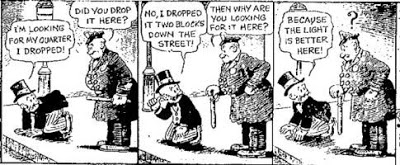There is a trend in the history of economic thought field to depend more on archival research. It is certainly nothing new, since some of the best research in the history of ideas, e.g. Sraffa's reconstruction of Ricardian theory, was essentially dependent on archives. The publication of Keynes collected papers have also sparked a wealth of interpretations about his theories, not all worth reading. I have done some research in Marriner Eccles archives at the University of Utah.In part, this trend results from the fact that there is increasingly more archival material for modern economists that are closer in time to us. Letters, unpublished papers, class notes and so on. That might be useful sometimes, but it can also lead to lamppost driven research or the streetlight effect, where
Topics:
Matias Vernengo considers the following as important: Economic dynamics, History of Economics, Prebisch
This could be interesting, too:
Matias Vernengo writes Esteban Pérez Caldentey on the Ideas of Raúl Prebisch
Matias Vernengo writes What’s the deal with The Smiths
Matias Vernengo writes How Industrialization Become the Core of Raúl Prebisch’s Thought
Matias Vernengo writes Is dependency over?
There is a trend in the history of economic thought field to depend more on archival research. It is certainly nothing new, since some of the best research in the history of ideas, e.g. Sraffa's reconstruction of Ricardian theory, was essentially dependent on archives. The publication of Keynes collected papers have also sparked a wealth of interpretations about his theories, not all worth reading. I have done some research in Marriner Eccles archives at the University of Utah.
In part, this trend results from the fact that there is increasingly more archival material for modern economists that are closer in time to us. Letters, unpublished papers, class notes and so on. That might be useful sometimes, but it can also lead to lamppost driven research or the streetlight effect, where researchers just look at where it is easier to find results, rather than to what really matters.
At any rate, Prebisch's 1948 classes at the University of Buenos Aires, from a few years after he was let go from the Argentinian Central Bank, and before he went to the Economic Commission for Latin America (ECLA, later ECLAC), on Economic Dynamics are (in our view) relevant because they do shed some light on how he thought about economic dynamics, a theme that was central for the theories and the policy action of ECLAC which did have a significant impact on how government in the region managed their economies in the 1950s and 60s.
They have now been published by CEPAL Review with an intro with Esteban Pérez. Link here. With Esteban we have this paper in English on Prebisch and his views on economic dynamics.

